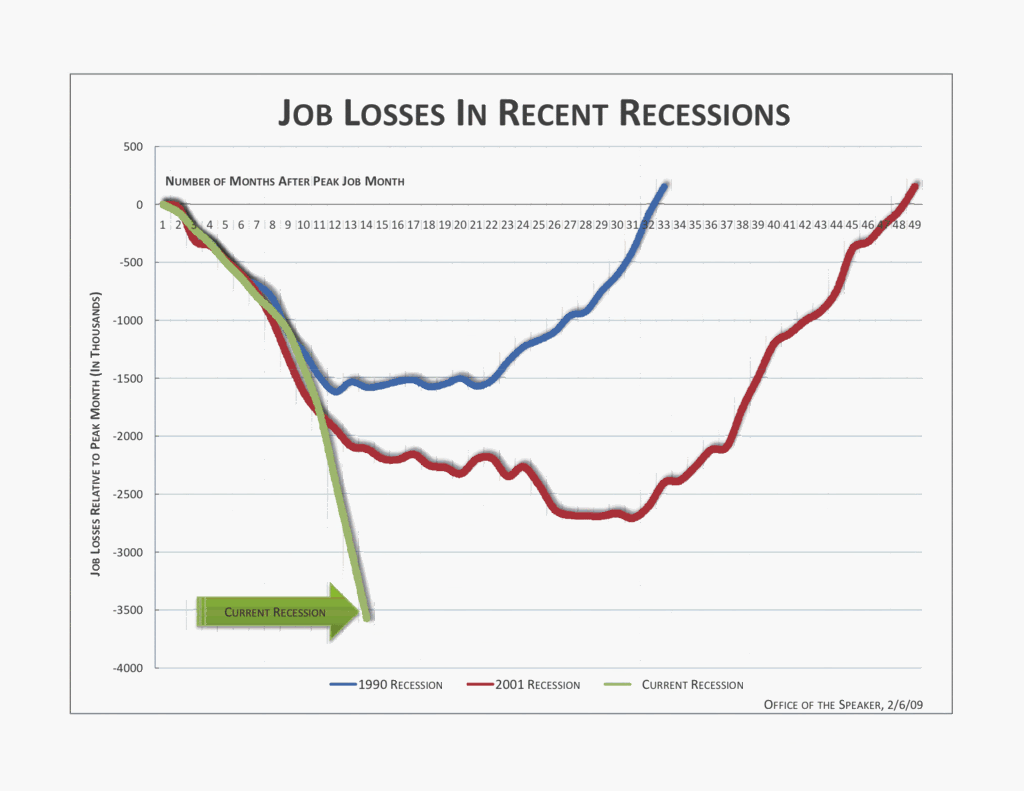
If you are having trouble reading the fine print: The blue line shows job losses in the 1990 recession; the red line is 2001, and the green line is the path we are on now.
To clarify, these are not projections. This is actual job-loss data.

Feb 07 2009

If you are having trouble reading the fine print: The blue line shows job losses in the 1990 recession; the red line is 2001, and the green line is the path we are on now.
To clarify, these are not projections. This is actual job-loss data.
44 comments
Skip to comment form
Author
how much I love Rachel Maddow. But last night, she really nailed it. This clip is 8 minutes and the whole thing is worth a look, but the last minute or so is when she really lets loose.
it’s only going to get worse. Nothing anyone can do (even if the venal repubs were trying to help, which of course they aren’t) will be able to avoid the consequences of 40 years of corruption, misrule and ideological idiocy. Everything has changed, our economy has collapsed, and our government, rather than do something bold like nationalize the financial, energy, and armaments industries and canceling all debts, is locked in simple-minded denial thinking they can just throw play money at the problem and somehow magically prop up this house of cards. At best this so-called stimulus will only kick the can a bit further down the road and not much further at that. Stimulus II will be on us in no time flat, just watch. It will be just as ineffectual. Then we’ll have Stimulus III because we can’t bring ourselves to think outside the box that brought us here. It’s a pity but it’s a fact. We’re too stupid and selfish to save ourselves.
Or maybe even more.
in the first place. The most sensible thing that should have been done when homeowners found themselves in trouble over their mortgages, due to loss of job, health or whatever the reason, would have been for the banks to re-negotiate their loans — that way, no one would have lost. Bush prevented that with his re-enactment of an 1863 National Bank Law, which effectively removed the States’ control over their banks and, thus, removed the ability of banks to re-negotiate the loans.
Listening to those Repugs’ arguments against the stimulus plan boils me in oil. “We need to take our time,” “it’s no good,” and blah, blah, blah. THEY are the ones that got us into this mess. THEY are the ones who screamed bloody murder for the bailout money using the same fear tactics that we have known for the past eight years “the sky would cave in” if they didn’t get it.
And, oh, after the big banks “ate up” the lesser banks and investment companies, look what they did
The stimulus bill probably isn’t the best, but that there is an urgency to do something is certainly no lie.
And, here we are continuing to fund two wars and obscene Pentagon spending.
Those are some graphs for you.
The economy is BAD? How the hell can an economy be good if over 50% of it is going toward two ill-begotten wars, and jobs having been created for over eight years now? It doesn’t take an economist to figure that out! M F’s!!!!
how does giving tax breaks to businesses who are already cutting employees help?
If there is no demand, no hiring will take place.
unless the business is on the verge of going under, it still helps them — they just get richer off the backs of remaining employees who have to take on yet an even greater work load. Working the pants off of workers has been going on for, at least, eight years plus now!
Check out this column from Saturday’s NYT business section:
http://www.nytimes.com/2009/02…
http://solari.com/blog/?p=2058